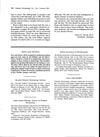 9 citations,
January 2009 in “PubMed”
9 citations,
January 2009 in “PubMed” Finasteride treatment can decrease certain steroids and increase others, possibly leading to depression symptoms in some cases.
 7 citations,
August 2019 in “Endokrynologia Polska”
7 citations,
August 2019 in “Endokrynologia Polska” The free androgen index varies among women with different types of PCOS.
 1 citations,
April 2023 in “PubMed”
1 citations,
April 2023 in “PubMed” Biocompatible artificial hair implants significantly improved patients' quality of life and were successful.
 December 2023 in “Acta dermato-venereologica”
December 2023 in “Acta dermato-venereologica” Tofacitinib is effective for treating alopecia areata, and starting treatment early may improve results.
 1 citations,
October 2021 in “Benha Journal of Applied Sciences”
1 citations,
October 2021 in “Benha Journal of Applied Sciences” People with acne have a different balance of certain antioxidants in their blood compared to healthy individuals.
 September 2020 in “Benha Journal of Applied Sciences”
September 2020 in “Benha Journal of Applied Sciences” Patients with Alopecia Areata have lower levels of zinc and biotin than healthy individuals.
 1 citations,
January 1984 in “Pediatric Dermatology”
1 citations,
January 1984 in “Pediatric Dermatology” Upcoming pediatric dermatology events and submission guidelines were announced.
 8 citations,
July 2011 in “Animal science journal”
8 citations,
July 2011 in “Animal science journal” Keratin 33A is a key protein in goat winter coats, especially in high-producing breeds.
 6 citations,
October 1993 in “The journal of the Royal Society of Health”
6 citations,
October 1993 in “The journal of the Royal Society of Health” Children's hair loss has many causes and requires careful diagnosis and personalized treatment, including emotional support.
November 1968 in “Journal of the American Pharmaceutical Association” 44 citations,
December 2005 in “Journal of Investigative Dermatology” Certain genetic markers, especially the MICA gene, are linked to alopecia areata.
36 citations,
October 2008 in “European journal of paediatric neurology” Valproic acid treatment may cause temporary hair loss due to reduced zinc and biotinidase levels, which tend to normalize after 6 months.
20 citations,
August 2015 in “Behaviour change” Cognitions significantly influence Trichotillomania, suggesting cognitive therapies could help.
 1 citations,
April 2022 in “Journal of The American Academy of Dermatology”
1 citations,
April 2022 in “Journal of The American Academy of Dermatology” Hair loss in men (androgenetic alopecia) is significantly linked to decreased scalp sensitivity, but not temperature sensitivity. More research is needed to confirm this. Comparing this hair loss to leprosy is unsupported and stigmatizing.
1 citations,
January 2021 in “Journal of The American Academy of Dermatology” Scalp nerve issues are linked to hair loss in men.
23 citations,
September 2020 in “Journal of Dermatological Science” Targeting Vδ1+T-cells may help treat alopecia areata.










